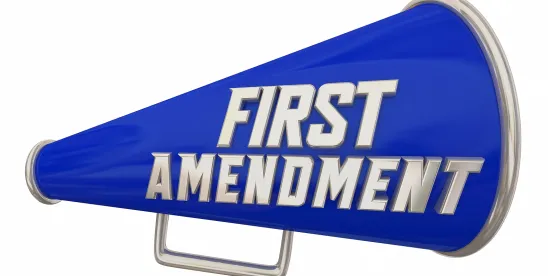On June 2, 2025, MSNBC reported that politically appointed officials of the Department of Veteran Affairs (VA) lashed out against two VA scientists for authoring a report that, according to the officials, painted the Administration in a bad light. The report, published in the New England Journal of Medicine, voiced that federal cuts to the VA could negatively impact veterans’ respiratory health.
According to internal emails obtained by The Guardian, the senior officials claimed that the scientists had violated VA policy by not getting their article pre-approved before publication. While VA officials argue that they are simply requiring coordination between scientists and public affairs staff, the swift response to the critical article strongly suggests that the Administration is sending a message that could result in the suppression of viewpoints critical of the current VA leadership.
The current Administration is not the first to attempt to stifle government scientists who, on their own time, publish information critical of their employers. Legal precedent from cases dating back to the 1990s, litigated under the administrations of both President George Bush and William Clinton, demonstrate that attempts to “chill” constitutionally protected speech by federal employees can be successfully challenged in federal court.
Sanjour v. EPA
The 1995 case Sanjour v. EPA is a prime example of a landmark suit that established the First Amendment rights of federal employees to criticize their agencies. In that case, the U.S. Court of Appeals for the District of Columbia Circuit ruled in favor of William Sanjour, an EPA employee who challenged federal rules that restricted federal employees’ right to explicitly criticize the policies of the EPA in presentations sponsored by environmental community groups.
The EPA “chilled” Sanjour’s speech by warning him that his acceptance of a cost reimbursement for travelling to North Carolina to give his presentation opposing EPA’s waste incineration policies could lead to disciplinary action (which could include termination). Based on these warnings Sanjour challenged the restrictive regulation, claiming that the rule had a chilling effect on his Constitutional right to publicly criticize EPA policy.
The Court ruled in favor of Sanjour. Its holding applied “black letter” law governing freedom of speech in the context of public employment: “Government employee speech is protected by the First Amendment, and can only be infringed when the government demonstrates that the burden on such speech is ‘outweighed by [its] necessary impact on the actual operation of the government.’”
The precedent in Sanjour v. EPA allows for federal employees who plan on making public statements to seek federal court injunctions preventing future retaliation based on their First Amendment protected speech. The court’s decision safeguards the employees’ rights to speak on matters of public concern, including speech that criticizes the government.
As the Circuit Court concluded, “It is perhaps the most fundamental principle of First Amendment jurisprudence that the government may not regulate speech on the ground that it expresses a dissenting viewpoint.” Moreover, the court emphasized the importance of public learning from federal employees who can offer valuable insights on government workings. These insights are vital for informed decision-making by the electorate – upholding our democracy.
Weaver v. United States Information Agency
In a similar 1996 case, Weaver v. United States Information Agency, the D.C. Circuit established a clear precedent that federal employees can seek pre-enforcement injunctive relief to prohibit federal agencies from improperly using preclearance procedures to suppress the publication of information critical of a sitting-administration.
The case involved Carolyn Weaver, a part-time employee of the United States Information Agency (USIA). She published an article in the Columbia Journalism Review critical of Voice of America (VOA) editorial policies. The VOA is a unit of USIA/Department of State. Weaver had submitted the article without pre-publication review and was consequently admonished by the agency.
Weaver challenged the pre-publication review procedure on the grounds of the First Amendment. Significantly, the D.C. Circuit recognized that the “circuit’s law affords employees in Weaver’s position a right to federal court review of their constitutional claims.”
In Weaver the Court held that an employee may be required to submit an article for review, but only for legitimate purposes (such as ensuring that classified information is not revealed). But of critical importance, it also held that federal agencies were prohibited from preventing the publication of articles simply because they were critical of the government. The court upheld the VOA procedures in large part because the agency explained that an employee could not be disciplined for publishing articles based on its content or viewpoint being critical of their agency, even if the agency failed to approve the article for publication.
Of course, an employee could still be disciplined for not providing a required “disclaimer” stating that the views in the article were his or her personal opinions, or if the article in fact illegally revealed classified information. But articles like those published by the VOA employee in Weaver or the VA employees in the New England Journal of Medicine would unquestionably be exempt from any such limitations. Moreover, any threat to take disciplinary action against employees who published articles that were disapproved for release could have a chilling effect on federal workers' rights to freedom of speech. Consequently, these types of threats could also be subject to challenge in federal court.
In other words, the key finding in Weaver is that public servants can seek pre-enforcement injunctive relief in the federal court based on the potential chilling effect of the government’s pre-publication regulations, or for threatening adverse actions, or for taking action against an employee who published an article despite the government’s decision to disapprove publication.
Applying the Pickering Standard
Both the Sanjour and Weaver cases reaffirmed the landmark public employee free speech case of Pickering v. Board of Education. In that case, a teacher was fired for publishing a letter to the editor critical of his school board’s funding priorities. The Supreme Court ordered that the teacher be reinstated and affirmed the rights of public employees to engage in Constitutionally protected speech.
The Pickering Court explained that public employees, such as the VA scientists, are in a critical position to inform the public of information vital to an informed electorate and the functioning of a democracy. The Court held:
[T]he question whether . . . additional funds [are needed] is a matter of legitimate public concern on which the judgment of the . . . administration, cannot, in a society that leaves such questions to popular vote, be taken as conclusive. On such a question free and open debate is vital to informed decision-making by the electorate. [Public employees] are, as a class, the members of a community most likely to have informed and definite opinions as to how funds allotted to the operation of [government programs] should be spent. Accordingly, it is essential that they be able to speak out freely on such questions without fear of retaliatory dismissal.
The circumstances the VA employees found themselves in bear a striking resemblance to those that faced the school teacher in Pickering. If tested in court the outcome of these two cases should be the same: vindication of the First Amendment and the public’s right to know.
Conclusion
The cases from the 1990s highlight the importance of freedom of speech protections for federal employees. A public employer cannot threaten constitutionally protected speech of a government employee, if that speech is given on their own time, and relates to matters of “public concern.” Such threats may indeed be unconstitutional and can be challenged for injunctive relief.
Federal employees, including VA scientists, are protected by the First Amendment, and any rule, regulation, or threat by the government to stifle their report may violate their Constitutional rights. Employees who work for the federal government do not surrender their First Amendment rights when they take a government job.
Employees who seek to speak or publish articles critical of their federal agency should carefully review the Sanjour and Weaver cases (and other similar cases). They should also seek counsel to ensure that they comply with rules that do not violate their Constitutional rights.
The American people have a right to hear from federal employees. They have a right to learn about problems within the federal government that impact the health and safety of the American people. Veterans have a right to learn from employees working for the VA if they are being harmed by government practices or policies.





 />i
/>i
